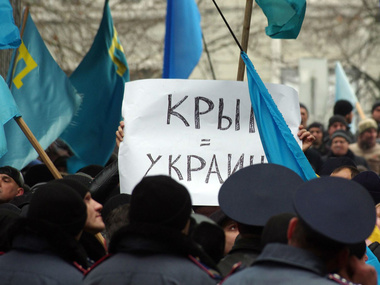UNDER SPECIAL PRESSURE
At the end of this month, on February 27, it will be a year since the armed special troops seized the buildings of the government and the parliament of the Crimea, and Russia began occupation of the peninsula. Human rights activists have been sounding the alarm for all this time: the number of human rights violations in the Crimea has increased sharply. Crimean Tatars who were pro-Ukrainian from the very beginning of the conflict and did not recognize annexation found themselves under special pressure of the local "authorities". About 10 thousand out of about 300 thousand Crimean Tatars had to move to the continental Ukraine. Human rights activists note that the pressure upon the Crimean Tatars did not become weaker over time, it has acquired a systematic nature. As the Vice-Chairman of the Majlis Nariman Dzhelyalov reported in his interview to the GORDON, hundreds of violations of the Crimean Tatars’ rights were recorded over the year. Not only activists, but also citizens who are not involved in the political life become exposed to persecution.
MURDERS AND KIDNAPPING
18 Crimean Tatars were reported missing in the Crimea last year. This figure was announced by the leader of the Crimean Tatar people, the former Chairman of Majlis Mustafa Dzhemilev. Some of them were contacted later, others were found dead. According to human rights activists, the destiny of five people is still unknown.
The Crimean militia is reluctant to investigate cases on missing people. As of February 2015, only four Crimean Tatars were searched by the Investigation Committee of the Russian Federation in the Crimea, but there was no progress in investigating these cases of kidnapping.
Human rights activists note: the so-called "self-defense" that is subordinate to the local authorities may be involved in at least four of these crimes. And it makes the search and punishment of guilty people almost impossible.
 Reshat Ametov with his son, 2010. Photo: Reshat Ametov / Odnoklassniki
Reshat Ametov with his son, 2010. Photo: Reshat Ametov / Odnoklassniki
The 39-year-old Reshat Ametov was the first to disappear on the peninsula. He was last seen on March 3, 2014 at the pro-Ukrainian demonstration in the center of Simferopol, from where people dressed in a camouflage took the activist away in an unknown direction. One of Ametov's relatives said in the comment to the Human Rights Watch organization that Reshat was well-known among the Crimean Tatars, he often addressed the authorities on local problems, and he regularly commented on political affairs on his Facebook page.
Ametov's body with traces of violent death was found 13 days later in the village of Zemlyanichnoye in Belohorsk district (60 km from Simferopol). According to his relatives, a penetrating punctured and incision wound in the eye could cause his death. Ametov had a wife and three children.
The body was terribly mutilated. He had knife wounds and bruises everywhere. One eye was missing. He had a plastic bag on his head.
From the interview of Ametov’s spouse Zarina to the German magazine Der Spiegel, September 2014
In early April, the investigative committee instituted a criminal case based on p.1 Art. 105 of the Criminal code of Russia (murder). Law enforcement agencies do not reveal any information on the investigation process. As the Crimean Field Mission for Human Rights (KPM) noted in one of its reports, there is "a certain data array" for this case indicating conscious disinterest of investigation authorities in finding and arresting accomplices.
The Vice-Chairman of KPM Olga Skripnik said in the comment to the GORDON that, according to information available to human rights activists, the "Crimean self-defense" is involved in Ametov's kidnapping. "However, since the "self-defense" is subordinate to Aksenov (self-proclaimed Prime Minister of the Crimea Sergey Aksenov. – GORDON), there are almost no chances that it will be held responsible," Skripnik emphasized.
At the same time, Aksenov publicly declared that representatives of the "self-defense" are not involved in Ametov's murder and noted later that "The Council of Ministers of the Crimea" is ready to award investigators for solving this crime.
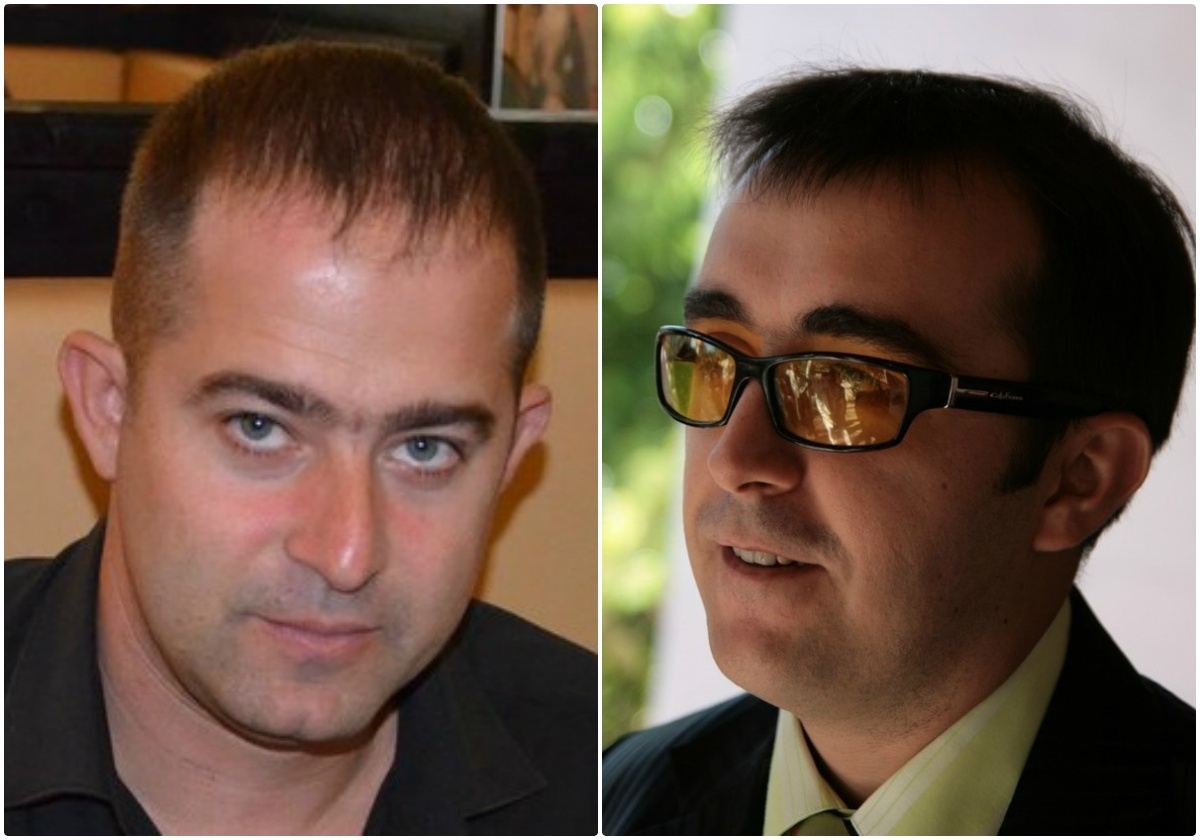 Seyran Zinedinov and Timur Shaymardanov disappeared in late May, their destiny has been unknown since then. Photo: Zarinka Topchi and Timur Shaymardanov / VKontakte
Seyran Zinedinov and Timur Shaymardanov disappeared in late May, their destiny has been unknown since then. Photo: Zarinka Topchi and Timur Shaymardanov / VKontakte
At the end of May, members of the Ukrainian House organization were reported missing in Simferopol – the 34-year-old businessman Timur Shaymardanov and the 33-year-old hauler Seyran Zinedinov. They were close associates, participated in demonstrations against annexation of the Crimea and helped the Ukrainian military during the blockage of their military units by the "self-defense" and "little green men".
On May 25, Shaymardanov left home for work, and nobody has seen him ever since. Five days later, Zinedinov disappeared who was actively looking for his friend. He met Shaymardanov's wife (approximately 300 m from his home) in the evening and told her that the "self-defense" may be involved in kidnapping the businessman, then he told his wife on the phone that he was coming back, but he never came home. Location of the Ukrainian House activists is still unknown.
Criminal cases for murder were instituted following the facts of disappearance of Shaymardanov and Zinedinov. There is no information on the results of investigation. Their relatives told the Human Rights Watch that during interrogations the investigators are more interested in political views of the activists, than in the fact of their disappearance. According to human rights activists from KPM, the "self-defense" may be involved in these cases of kidnapping, too.
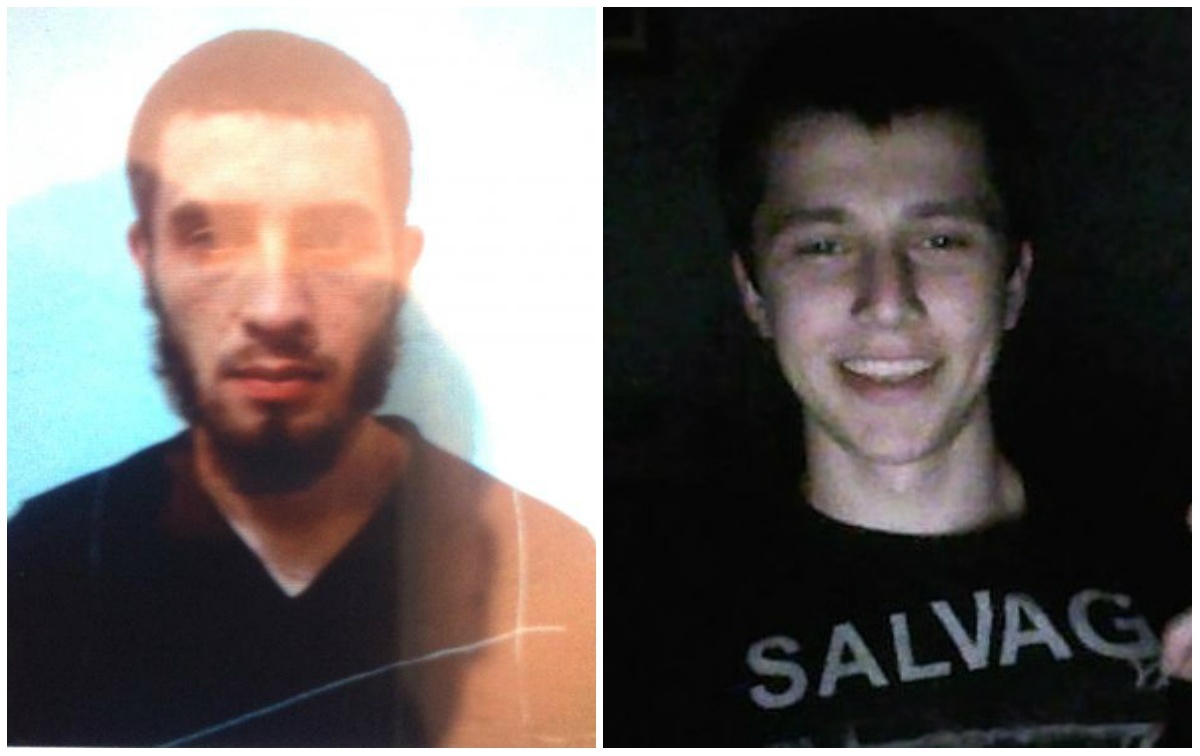 Brothers Dzhevdet Islyamov and Islyam Dzhepparov disappeared in late September. Photo: crim.sledcom.ru
Brothers Dzhevdet Islyamov and Islyam Dzhepparov disappeared in late September. Photo: crim.sledcom.ru
On September 27, the 18-year-old Islyam Dzhepparov and his 23-year-old cousin Dzhevdet Islyamov were kidnapped in the village of Sara-Su near Belogorsk. The young people were last seen on the road: unknown people in black uniforms (at the suggestion of human rights activists from KMP, they were representatives of the "self-defense") first searched the guys, and then pushed them in a blue minibus with tinted glasses and left in an unknown direction. Dzhepparov's father Abdurashid immediately reported to the police about kidnapping of the son, but, according to him, law enforcement authorities were negligent in searching the young people. Dzhepparov considers that the Russian law enforcement agencies are involved in kidnapping the brothers.
According to Deutsche Welle, Dzhepparov’s eldest son Abdullah disappeared in Syria in 2012. Perhaps, he took part in military operations for the opposition together with Dzhevdet Islyamov there. Later, Dzhevdet came back home, but Abdullah did not.
A criminal case under the article "kidnapping committed by a group of persons by previous concert" was instituted after Dzhepparov and Islyamov's disappearance.
They kept me until one o'clock in the morning, asking me about Islam, about its different streams, about radicalism – as if I know anything about it. I know that the investigators need to collect information, but I can be understood as a father after all – my son was missing!
From the interview of Islyam Dzhepparov’s father Abdurashid to Deutsche Welle, November 2014
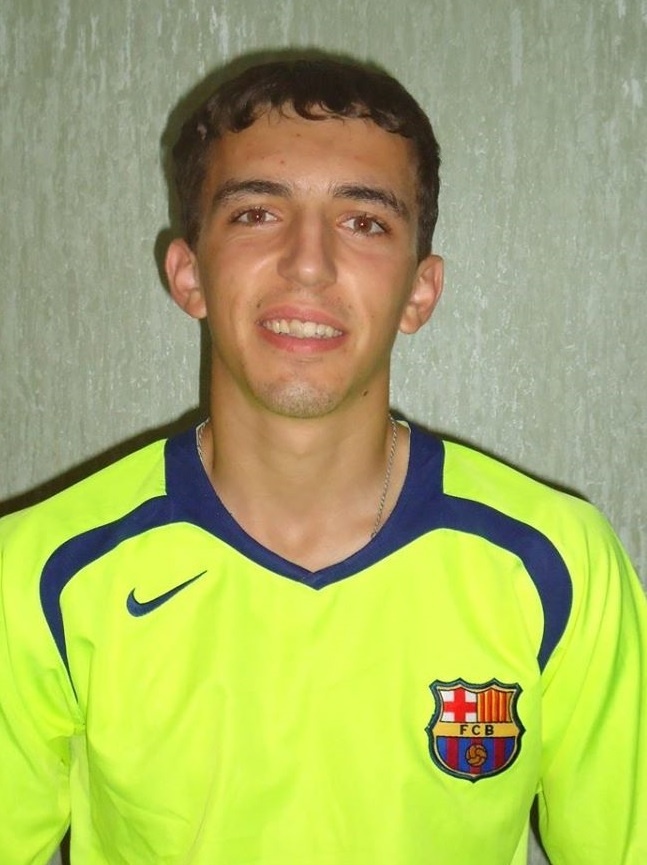 Eskender Apselyamov disappeared on his way to work on October 3. Photo: Crimean Ukrainians / VKontakte
Eskender Apselyamov disappeared on his way to work on October 3. Photo: Crimean Ukrainians / VKontakte
On October 3, the 23-year-old Eskender Apselyamov disappeared in Simferopol. Around 17.30 he left the rental apartment and went to work to the bakery (15 minutes walking distance from his home), but he did not appear there. He was last seen in a shop near his work where he bought cigarettes. Apselyamov's phone turned on for 15–20 minutes in the evening in the day of his disappearance, but he discarded all calls. Apselyamov's relatives went to all hospitals, police stations and mortuaries of Simferopol after his disappearance, but he could not be found anywhere. According to the relatives of the Crimean Tatar, he was fond of soccer and did not participate in the political life of the peninsula at all.
There is still no information on the missing Apselyamov on the web-site of the Crimean Investigation Committee. Eskender’s mother Aishe Apselyamova reported in the comment to the GORDON that a criminal case for disappearance of her son was instituted (she does not know under which article), parents periodically meet the investigator. "I call him by phone and ask whether there is any news. Unfortunately, there is no news," Apselyamova said.
There are two other inconsistent stories related to the loss of the Crimean Tatars last year. In one case, a young man was found dead, in the second case only one of two missing friends survived. Was their disappearance kidnapping? Local "authorities" say that it was not. However, human rights activists are still not sure of it.
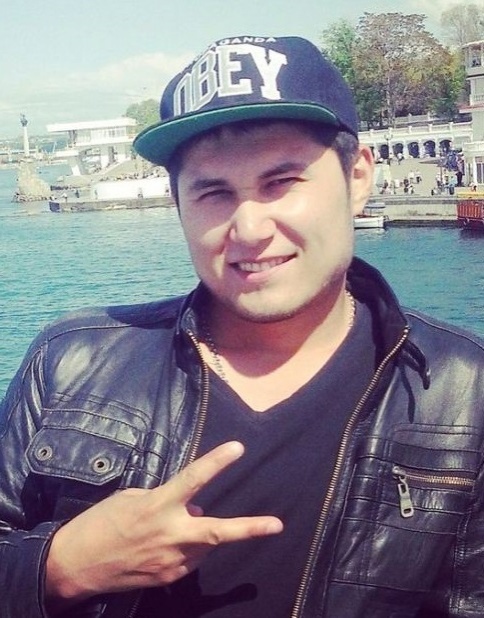 Edem Asanov was found hung up a week after his disappearance. Photo: 15minut.org
Edem Asanov was found hung up a week after his disappearance. Photo: 15minut.org
On September 29, the 25-year-old rescuer Edem Asanov disappeared on his way to work from Saki to Yevpatoria. He was found hung up in an abandoned sanatorium in Yevpatoria on October 6. There was a suicide note near Asanov’s body saying that he had an illness that allegedly pushed him to a suicide. The relatives of the dead first said that Asanov could not commit a suicide, but then urged journalists not to look for political implications of his death.
Right after Asanov's disappearance, it became known that a person with the same surname appeared in the case of "Oleg Sentsov's group" which was allegedly preparing acts of terrorism on the peninsula. It turned out later that it was Asanov’s namesake with a different patronymic. KPM noted that the relatives set Asanov's funeral for an earlier date so there was no possibility to establish traces of violence on his body.
There is a version that Asanov had the same surname as the person in Sentsov’s case, and, allegedly, he was kidnapped incidentally. But when they (kidnappers) found out that it was a different person, they organized a suicide to hide the crime. The relatives behave very strangely in this story. If we say that it was a suicide and that everything was transparent why were not we provided a death certificate? It gives rise to suspicion.
From the interview of the Vice-Chairman of the Crimean Field Mission for Human Rights Olga Skripnik to the GORDON, February 2015
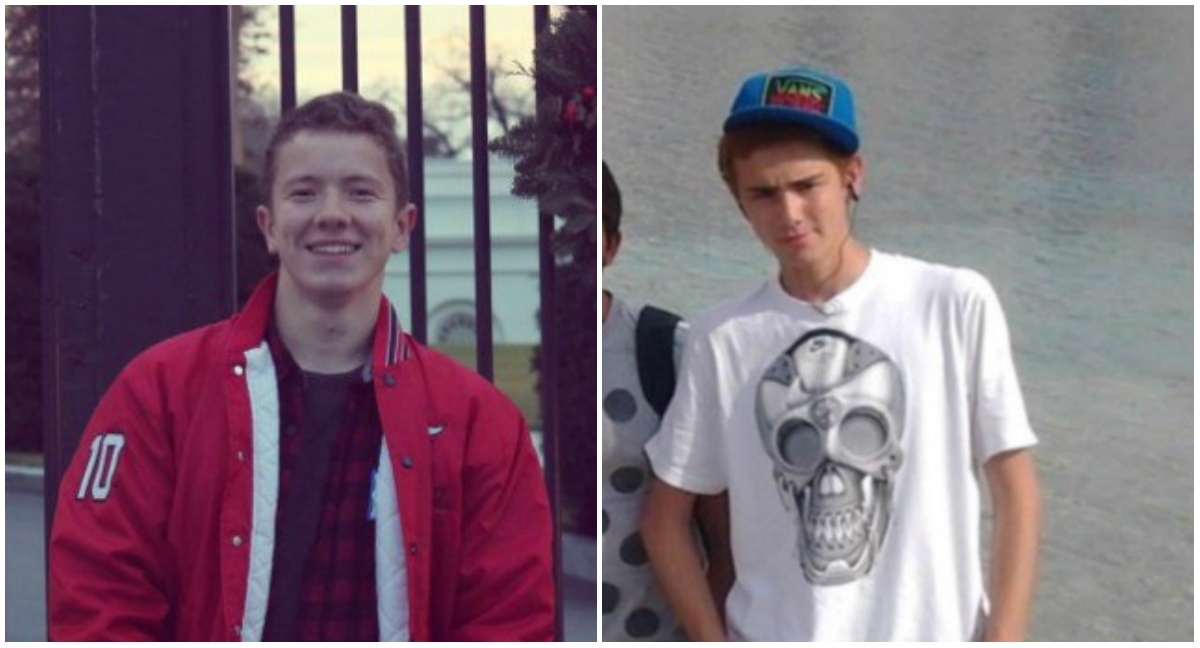 Artem Dayrabekov and Belyal Bilyalov disappeared on October 13, Bilyalov was found dead a day later. Dayrabekov does not want to tell the journalists what happened that day. Photo: Artem Dayrabekov / VKontakte and krymr.org
Artem Dayrabekov and Belyal Bilyalov disappeared on October 13, Bilyalov was found dead a day later. Dayrabekov does not want to tell the journalists what happened that day. Photo: Artem Dayrabekov / VKontakte and krymr.org
On October 13, two 18-year-old students, Artem Dayrabekov and Belyal Bilyalov, disappeared in Simferopol. In the afternoon, they were seen at a football match at the stadium of one of Simferopol higher educational institutions, and then communication stopped, and phones were switched off.
Bilyalov's body was found on the outskirts next evening. The Head of the Crimea Charity Foundation Riza Asanov reported that there were traces of cruel tortures on his body. Allegedly, Dayrabekov got to hospital with the same knife wounds. According to the official version, Bilyalov died from poisoning with smoking mixtures. Allegedly, Dayrabekov was hospitalized with a similar diagnosis, and was allowed to go home after treatment. There are still a lot of discrepancies in the case of disappearance of these students. It was reported in the message of the Crimean "Ministry of Internal Affairs" that Dayrabekov gave written evidences to police officers that he used smoking mixtures together with his friend. At the same time, according to the Crimean mass media, Dayrabekov said right after the incident that he had "a usual poisoning", not with smoking mixtures. The GORDON tried to contact Dayrabekov through the VKontakte social network, but he blocked access to his page after our message.
It is very difficult to collect information in this case since all relatives who can tell something block us in social networks, too. Most likely, they are frightened. We only know that acquaintances and those who live in that area have different opinions concerning Bilyalov's death, and not all of them coincide with the official version. But, unfortunately, we cannot give any facts. These are only assumptions so far.
From the interview of the Vice-Chairman of the Crimean Field Mission for Human Rights Olga Skripnik to the GORDON, February 2015
BAN ON ENTRY INTO THE CRIMEA TO LEADERS OF THE CRIMEAN TATARS
On April 22, 2014, Mustafa Dzhemilev was read and handed in the ban on his entry to the territory of Russia till 2019 when he was leaving the Crimea. It did not have signatures or seals, so it was unclear whether it was a real document. However, on May 3, the leader of the Crimean Tatar people was not allowed to the Crimea. That day, several thousands Crimean Tatars who wanted to help Dzhemilev to get on the peninsula gathered in Armyansk at the border with continental Ukraine. They broke through the cordon of frontier guards and military men and met their leader chanting his name and the slogan "Millet! Vatan! Kyrym" ("Nation! Homeland! Crimea").
Dzhemilev challenged the ban against entry into the Crimea in court. According to his Russian lawyer Mark Feygin, it could be established from scrappy statements of federal bodies that the entry into Russia is forbidden for the leader of the Crimean Tatars "for the reasons of national security".
Two months later, on July 5, the head of Majlis of the Crimean Tatar people Refat Chubarov who was coming back from a field meeting of Majlis in Genichesk in Kherson region was not allowed to the Crimea, too. At the Chongar checkpoint, the so-called prosecutor of the peninsula Natalya Poklonskaya read a warning of extremist activity and the resolution on the ban on his entry to the territory of Russia for five years – till 2019.
Poklonskaya later declared that the ban on entrance of the leaders of the Crimean Tatars to the territory of the Crimea reduced tension on the peninsula, and the so-called Prime Minister of the Crimea Aksenov called Dzhemilev "a terrorist" in a conversation with a BBC journalist.
Aksenov obviously loses self-control when I ask him a question why the leader of the Crimean Tatars Mustafa Dzhemilev was not allowed to return to the peninsula. He sharply tells me that Dzhemilev is "a terrorist" who kindles hostility between nations and is an agent of Western intelligence services in the Crimea. "Everybody knows it," he says in response to my bewilderment. "Nobody even tries to hide it".
From Lucie Ash's material "Nobody looks for the missing Crimean Tatars in the Crimea" at the BBC site, August 2014
Active members of the Crimean Tatar movement also face problems when entering or leaving the peninsula. Thus, in the evening January 19, the member of Majlis and lawyer Emine Avamileva was kept by the officers of the Russian border service for more than two hours at the Armyansk checkpoint without any explanations, and on January 23, the coordinator of the Committee on Protection of the Rights of the Crimean Tatar People Sinaver Kadyrov was detained in "Armyansk" and then deported from the Crimea.
SEARCHES IN HOUSES, SCHOOLS, AND MOSQUES
Mass searches in the homes of Crimean Tatars began last May and are still continuing. According to the estimates of human rights activists, Russian law enforcement agencies checked homes of more than a hundred people under the pretext of searching for weapons, drugs, and banned literature. Searches are held both in the homes of ordinary Crimean Tatars, and in the homes of their leaders. However, according to the KPM, most attention was paid to the participants "of the case on May 3," when thousands of Crimean Tatars met their leader Mustafa Dzhemilev, who had previously been banned from entering Russia, on the border with mainland Ukraine. It is known that searches were conducted in Dzhemilev’s house in Bakhchisaray on May 14, in Majlis member Eskender Bariev’s apartment in Simferopol on September 16, and in the Bakhchisaray house of the Deputy Chairman of Majlis Ahtem Chiygoza on January 30.
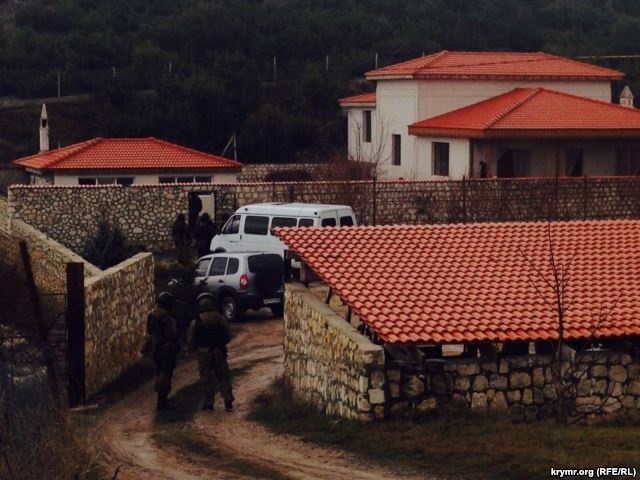 Armed law enforcement officers surrounded Akhtem Chiygoz' house in Bakhchisaray and did not allow anyone to approach it during the search on January 30. Photo: krymr.com
Armed law enforcement officers surrounded Akhtem Chiygoz' house in Bakhchisaray and did not allow anyone to approach it during the search on January 30. Photo: krymr.com
Law enforcement officers are looking for literature included in the federal list of extremist materials in mosques and schools. It includes more than 2500 items. These are not only books, but also leaflets, newspapers, brochures and even Internet articles. Immediately after mass searches, the Muftiate of the Crimea urged Muslims to get rid of forbidden texts. Local media reported several cases when Crimean Tatars were fined for keeping literature from the list.
Some of these books (from the list) are non-sectarian, in particular, some were published in Moscow, brought here from the Russian Federation, and sold here in the shops, and people bought them. Now there are searches of mosques and madrassas, where, for example, a small booklet "The Fortress of the Muslim" was found. Every other Muslim probably has it, it is very popular here, there is prayers in it. And it will be wrong to impose sanctions against the Crimean Muslims who faced a ban of any literature for the first time.
From video message of the Deputy Mufti of Crimean Muslims Ayder Ismailov, August 2014
PERSECUTION AND ARRESTS OF ACTIVISTS AND MEJLIS LEADERS
Hundreds of activists were brought to administrative responsibility following the "case of May 3". The Crimean "Prosecutor’s Office" recognized meeting of Dzhemilev as "an illegal public action of extremist nature" and threatened to ban activities of the Parliament. More than 200 protesters were fined for the amount from RUB 10 to 40 thousand (2300-9300 UAH).
 Edem Osmanov – the only participant of the protest on May 3 who is held in investigatory isolation ward now. Photo: Edem Osmanov / VKontakte
Edem Osmanov – the only participant of the protest on May 3 who is held in investigatory isolation ward now. Photo: Edem Osmanov / VKontakte
Detentions and arrests for this case did not begin until almost six months later in October 2014, and they are still continuing. Musa Apkerimov was arrested on October 16, Rustam Abdurakhmanov on 17 October, Tair Smedlyaev on October 22, Eden Ebulisov on November 25, and Eden Osmanov on January 21. All of them were charged with violence against a police officer on May 3. The first four activists were kept in investigatory isolation ward for one to two months, but now they were allowed to go home on own recognizance with restricted travel or on bail. Pre-trial investigation of their cases is still in progress.
Osmanov is still in custody, the court arrested him for two months. The Crimean newspaper "15 Minutes" reported that Osmanov is a son of the businessman Mustafa Osmanov who was cooking prepared pilaf for protesters on the Independence Square in Kiev in December 2013.
"The case of May 3", in my opinion, is transforming into a version of the Bolotnaya Square case in the scale of the Crimea. There will be many more searches under this case. People will be questioned and leaders will be shut. It was initially said that this case concerned illegal border crossing. Then there appeared an episode with the alleged assault causing bodily harm against a Berkut officer. All this – both searches, and the prosecutor's checks, and arrests – can become elements of pressure.
From the comment of the Deputy Chairman of the Crimean Field Mission on Human Rights Dmitry Makarov, November 2014
On January 23, there were searches in the homes of three Crimean Tatars in Sevastopol: 29-year-old Ruslan Zeytullaev, 28-year-old Rustem Vaitov and 38-year-old Nuri Primova. They were detained the same day and later they were arrested for two months. All the three of them are now in the Simferopol investigatory isolation ward, they are charged with involvement in the Hizb ut-Tahrir organization. Russia is the only country in the world where this organization is recognized as a terrorist organization.
As Zeytullaev’s wife Meryem said in an interview to the ATR channel, somebody knock at their house early in the morning, said that they were neighbors and needed help. When the spouses opened the door, law enforcement officers were standing on the threshold. Meryem said that the officers were interested in literature about Islam. As a result, they confiscated several leaflets, brochures and a computer system unit. "They said that this literature could be prohibited in Russia. It means that they do not know what literature it is," Zeytullaeva said.
According to the lawyer Emil Kurbedinov, one of the detainees may be sentenced for 15 to 20 years of imprisonment or even life imprisonment for organizing activity of a terrorist organization, the other two may get from five to ten years for participation. Kurbedinov said that detainees attracted the attention of the Security Service of Ukraine before the annexation of the Crimea, but they won the lawsuit then.
It has yet to be proved that these people belong to such stream as Hizb ut-Tahrir. <...> It is a sort of a test for the Crimean Tatars. If people say now that he is a "Hizb", it serves him right, then it will starts everywhere. Any Muslim who is undesirable for the authorities can be accused of terrorism. Thus, these detentions are a kind of an acid test for the people.
From the interview of the lawyer Emil Kurbedinov to the Krym.Realii newspaper, January 2015
The deputy chairman of the Mejlis Ahtem Chiygoz was detained in the Crimea on January 29. He is charged with organizing mass riots during the protest action near the Crimean parliament in Simferopol on February 26, 2014. Two demonstration were taking place then: Crimean Tatars who advocated unity of Ukraine were taking part in one of them, while supporters of the peninsula joining Russia were taking part in the other one. There were skirmishes during the demonstration, and two people died.
By the decision of the court, Chiygoz will remain in custody until February19. "Chiygoz’s arrest is nonsense. No single lawyer can believe it. His case concerns events of February 26, and Russia has no relation to that period. It is only Ukraine’s jurisdiction," - the human rights activist from KPM Olga Skrypnyck said in the comment to the GORDON.
Another person involved in the "of the case on February 26", Eskender Kantemirova, was arrested for two months on February 8. According to investigators, he "caused injuries to a number of citizens" during the "mass disorders" near the parliament in Simferopol.
BAN ON PEACEFUL ASSEMBLIES
The Crimean "authorities" banned all public events applied for by Crimean Tatars during the previous year. First, a decree was issued banning mass actions on the peninsula until June 6, 2014. Thus, the traditional memorial demonstration of May 18 dedicated to the 70th anniversary of the deportation of people from the Crimea was also banned. Commemoration demonstrations were held in Simferopol and Bakhchisaray on this day, but they were not so mass as usual. Russian military helicopters were circling over the demonstrations of the Crimean Tatars.
The Chairman of Mejlis Refat Chubarov said then that it was the first time for 23 years that the Crimean Tatars faced a prohibition of mass commemorative events.
There are 22 regions here, there are places of worship and memorial stones in each of them, and the Crimean Tatars are not even allowed to go there and commemorate people’s souls on May 17-18? I do not know who one should be not to think about the consequences, and I do not know how to stop people. It's as if you were told: do not go to your holy places, do not go to your dead. How would you act?
Refat Chubarov, May 2014
The annual celebration of the Day of the Crimean Tatar flag in Simferopol on June 26, the demonstration dedicated to the pan-European Day of Remembrance of Victims of Stalinism and Nazism on August 23, and the action timed to the International Day of Human Rights on December 10 were all forbidden.
ATTACKS ON CRIMEAN TATAR MEDIA
Last June, the editor-in-chief of the Avdet newspaper (Majlis’ press) Shevket Kaybullaev was issued a warning for "the propaganda of extremism" by the "Prosecutor’s Office" of Simferopol. According to law enforcement officials, the newspaper published extremist terms "annexation" and "occupation". The same month, Kaybullaev was summoned for an interrogation to the Federal Security Service for publishing "extremist materials" on the decision of the Majlis to boycott the elections to the Crimean parliament. In September, Kaybullaev received a third warning. This time he was accused of publishing hidden appeals not to participate in the elections. At the same time, there was a long-lasting search in the editorial office of Avdet (it was located in the same building as the Majlis in Simferopol). Despite the pressure, Kaybullaev declared that the newspaper will not change the editorial policy.
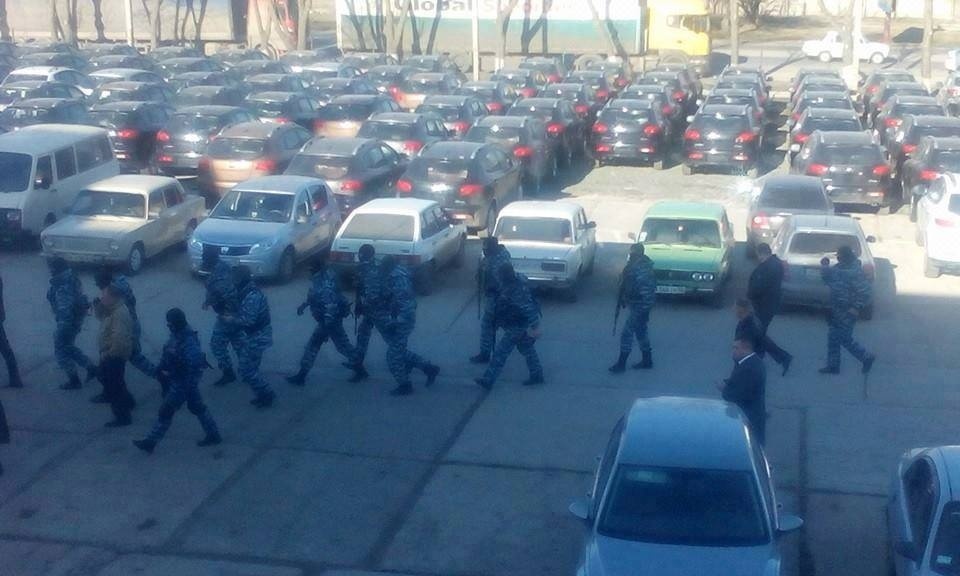 Security officers were searching the editorial office of the ATR TV channel for seven hours. Photo: Lerane Crimea / Facebook
Security officers were searching the editorial office of the ATR TV channel for seven hours. Photo: Lerane Crimea / Facebook
On January 26, security officers in masks cordoned off the building in Simferopol with the office of the Crimean Tatar ATR channel. Offices were being searched for seven hours. According to the authorities, security officers searched for TV footage from the demonstration that took place on February 26 last year near the building of the Crimean parliament when two people were killed. The ATR staff claimed that they had provided all the necessary video at the request of the investigating authorities and called the search a mechanism of pressure. The work of the channel was blocked throughout the day.
However, the Crimean "authorities" claimed that the actions of law enforcement officers at the TV channel were justified.
I believe that those media that, in the tense situation and against the background of cross-border conflicts, intimidate people with a possibility of the Crimea returning to Ukraine, with a possibility that all people, so to say, will be dealt with, that Ukrainian troops will come and bring order ... Well, you understand, I personally will not allow it.
From the interview with the "Prime Minister" of the Crimea Sergey Aksenov on the Kommersant FM radio, January 2015
REACTION OF UKRAINE AND THE WORLD TO THE OPPRESSION OF CRIMEAN TATARS
UKRAINE
The reaction of the Ukrainian authorities to the reports about violations of the Crimean Tatars’ rights on the peninsula were often limited to the statement of the Ministry of Foreign Affairs of Ukraine on non-discrimination. The latter concerned Chiygoz’ arrest. "This shameful event is continuation of the criminal policy of the Russian Federation in the occupied Autonomous Republic of Crimea, aimed to discredit the entire Ukrainian nation and to intimidate activists of the Crimean Tatar people who resist to it the most," read the statement of Ukrainian diplomats of 30 January. The Ministry called upon Russia to stop the persecution of Crimean Tatars and the international community to condemn the Kremlin’s policy.
Tthe Prosecutor General’s Office of Ukraine instituted criminal proceedings on some of the cases described above. In particular, it was reported that Ukrainian investigators were engaged in investigating Ametov’s murder, kidnapping of brothers Dzhepparov and Islyamov and Chiygoz’ arrest. At the same time, according to human rights activists, effectiveness of these criminal proceedings is minimal because Ukrainian investigators cannot even come to the scene and talk to witnesses.
WORLD
Deterioration of the human rights situation in the Crimea in the last year attracted attention of many governments, international institutions (OSCE, UNO, PACE) and human rights organizations (Human Rights Watch, Amnesty International and the Crimean Field Mission on Human Rights). Thus, in the resolution of January 27, PACE expressed concern about the death and disappearance of political figures who criticized annexation of the Crimea by Russia, it urged not to press on the media, in particular, on the Crimean Tatar channel ATR, as well as governmental bodies of the Crimean Tatars.
Last year, Human Rights Watch prepared at least three reports on the human rights situation in the Crimea. In particular, they mentioned persecution of the Crimean Tatars – enforced disappearance, detention of activists, persecution of Majlis, mass searches and possible involvement of the "Crimean self-defense" in some crimes. Several statements about persecution and violence against the Crimean Tatars were made by Amnesty International.
Human rights activists from the Crimean Field Mission on Human Rights are the only ones who work on the peninsula on a regular basis. Since last March, they have been monitoring the situation of human rights in the territory of Crimea and have published very detailed monthly reports on all violations on their website. The Ukrainian Ombudsman Valeriya Lutkovska stated that the Mission's reports are probably the only source of objective information about the situation on the peninsula.
HOW CAN WE HELP THE CRIMEAN TATAR PEOPLE?
BOGDAN YAREMENKO: RUSSIA’S OBJECTIVE IS CLEAR – THEY WANT TO DESTROY THE CRIMEAN TATAR MOVEMENT, BUT WE CAN ALLEVIATE THIS PRESSURE
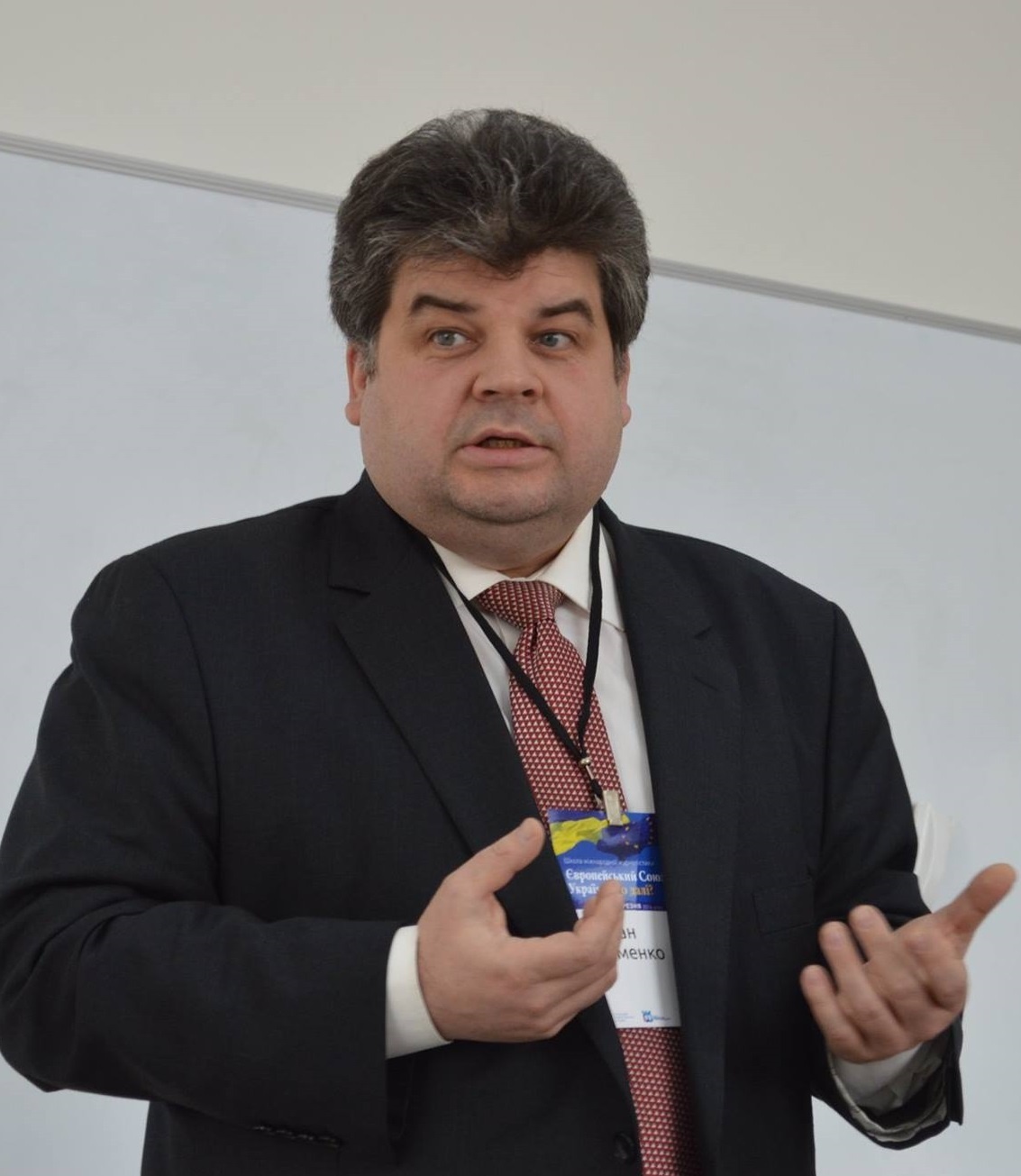 Ukrainian diplomat, former Consul General of Ukraine in Istanbul Bogdan Yaremenko. Photo: Gennady Matvienko / Facebook
Ukrainian diplomat, former Consul General of Ukraine in Istanbul Bogdan Yaremenko. Photo: Gennady Matvienko / Facebook
- Firstly, we must clearly understand that the situation with the rights of the Crimean Tatars is not getting worse because of the actions of the Ukrainian authorities, but because of the occupation of the Crimea by the Russian Federation. Secondly, both international law and Ukrainian national legislation lays responsibility for human rights on the occupying state, that is on Russia.
As for the reaction of Ukraine on these issues... It is hard to say whether it is possible to do more in a situation when the Crimea is completely and effectively controlled by the Russian armed forces and law enforcement agencies. Another thing is that neither the Crimean Tatar organizations, nor the Ukrainian government have come to an understanding what to do with the Crimea and Crimean Tatar problem, although expert community has already put forward such proposals. They suggest creation of some kind of parallel governance structures of the Crimean Tatar movement and the Autonomous Republic of Crimea in Ukraine, as well as establishment of the executive body of the central government, which would deal with the Crimean issue. Ukraine needs to create a full-fledged Crimean Tatar environment in the areas that are not occupied by Russia. This is a common task for the government and for the Ukrainian non-governmental organizations, and for the Crimean Tatar organizations.
Russia outplays us so far. It manages to decapitate the Crimean Tatar movement, whereas Ukraine has no effective counter-strategy
We need to grant the Crimean Tatars a status of indigenous people in accordance with the UN Convention, and probably decide on the establishment of the Crimean Tatar national autonomy in the Crimea without control over the peninsula itself. Thus, we could build the institutions that would be engaged in collecting information and responding to the challenges of the Crimean Tatars. And everything remains the same so far: a number of organizations, first of all, those of Crimean Tatar, respond to their problems, sometimes they are joined by Ukrainian public organizations, occasionally by the Ministry of Foreign Affairs. But the matter is not that these actions are insufficient. Everything is done correctly: the issue of the Crimean Tatars is raised both in PACE and in the European Union. We just need to move to another level of organization. And Russia outplays us so far. It actually manages to destroy the Crimean Tatar movement by pressing on activists and Majlis, to decapitate Crimean Tatar organizations by cutting them off from their leaders who remained in Kiev, whereas Ukraine has no effective counter-strategy.
Russia's objective is clear – they want to destroy the Crimean Tatar movement, to make it completely subjugated and controlled. And it will try to achieve this. But what we can achieve is to reduce pressure on the Crimean Tatar people and organizations. A strategic goal must be set here, and it is not release of several activists or reaction to their persecution, but rather liberation of the Crimea and change of attitude towards the Crimean Tatar issue. Otherwise, we will always remain in the rear, only reacting to the problem. There are discussions, but they will not give any results without a change of approach.
OLGA SKRIPNIK: CRIMEAN TATARS ARE A UNITED FORCE THAT CAN RESIST OCCUPATION
 Deputy Chairman of the Crimean Field Mission of Human Rights Olga Skripnik. Photo: Centre for information about human rights / Facebook
Deputy Chairman of the Crimean Field Mission of Human Rights Olga Skripnik. Photo: Centre for information about human rights / Facebook
- Last year, we recorded violations in almost all spheres of human rights in the Crimea. And these were not individual cases, but regular violations. All those who openly support Ukraine and do not recognize the annexation were at risk. Since there are a lot of such people among the Crimean Tatars, there is a certain tendency to ethnic discrimination.
Crimean Tatars have become a vulnerable group for many reasons, including the political position. Indeed, in early March Majlis said that it did not support the referendum (on the status of Crimea that was held on March 16. – GORDON) and does not recognize its legitimacy. Generally, Crimean Tatars are a united and organized force that can resist occupation. Most likely, the Crimean government supported by Russia feel this danger and has therefore begun a covert struggle against the Crimean Tatars.
To understand the situation, it should be taken into consideration that the situation in the Crimea is very unstable now. Euphoria has already gone, "Oh-oh-oh, Russia has come. Everything’s wonderful." Even those who supported the annexation have already realized that not everything came true and that there were many lies. For example, the military men have not received pensions for two months. Officially, it is due to recalculation, but there are still no pensions. When a united force that can bring people together arises at the background of these social difficulties, it is a big problem. All totalitarian regimes restrict those who can be opinion leaders and can organize some resistance.
The Ukrainian President must constantly appeal to Ukrainian citizens who live in the Crimea and are actually hostages, but this does not happen
The reaction of the Ukrainian authorities to these problems is another issue. All their actions are not sufficient. And this is confirmed by many facts. For example, the so-called transport blockade did not improve the situation, but only cut off the Crimea from the mainland Ukraine. Another example is the treacherous law on free economic area, which actually forces people to get Russian citizenship because they are not residents of Ukraine. But there have even been no statements about these problems recently. And if we speak about statements, they should be done by the president (not the Ministry of Foreign Affairs. – GORDON) because he is the guarantor of the Constitution. He must constantly appeal to the citizens of Ukraine who live in the occupied territory of the Crimea and are actually hostages. And the president does not appeal to them. Furthermore, he has adopted the national development strategy 2020, which does not include Crimea at all. It is not mentioned there! And how should people react to the fact that the president has simply crossed them out? Generally, there are so many unacceptable mistakes from Ukraine – both in relation to the Crimean Tatars, and to all those who live on the peninsula. At least these two laws – on the free economic area and on the occupied territory of Ukraine – should be amended immediately.
If we talk about the international community, it is in an unusual situation. Europe is used to the presence of such structures as the Council of Europe and the European Parliament that can solve the problems by political, economic or diplomatic means. But now we have faced an aggressor, for whom they are not effective. Only war can influence him , but no one wants to wage this war. That's the problem. All these means are effective when there is no war, when it is possible to negotiate. But they do not have the understanding what they should do if the war has already broken out. And it is important that the issue of the Crimea should be the first – both in the rhetoric of Ukrainian politicians and in the rhetoric of European parliamentarians and international organizations. Because it all started with the Crimea. And the problems can only be solved when the peninsula will be returned to Ukraine and we will be able to talk about restoring an international situation. Now it seems that improvement of the situation for the Crimean Tatars is possible only when the Crimea will return to the jurisdiction of Ukraine.
Do the Crimean Tatars themselves have an action plan? I do not think they have a clear vision of what to do because no one knows what will happen next. The situation is very unpredictable for everyone now – for the Crimean Tatars, for the international community, and for Ukraine. Therefore, I am not sure that there is any strategy. But whatever the strategy, it should first of all be aimed at the protection of average people, not some selfish or public interests. It is clear that people are not important for Russia, but it is important that Ukraine should preserve the value of human life and do everything to protect both the Crimean Tatars, and all those who remained in the Crimea.
NARIMAN DZHELYALOV: CRIMEAN TATARS HAVE RECENT EXPERIENCE OF NATIONAL STRUGGLE IN SIMILAR CONDITIONS DURING THE SOVIET PERIOD
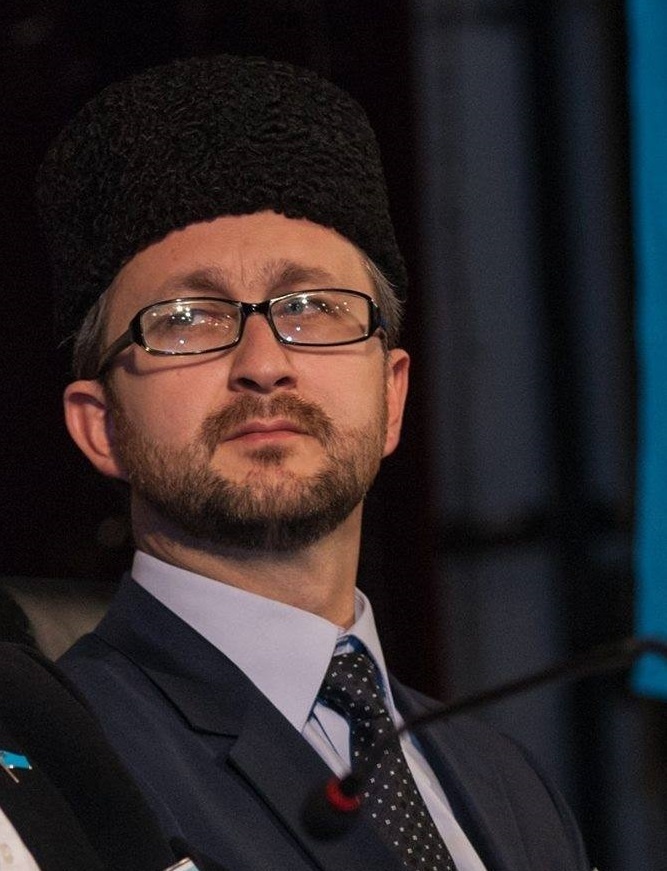 Deputy Chairman of the Majlis of the Crimean Tatar people, Head of the Information and Analytical Administration. Photo: Crimean Muftiate / Facebook
Deputy Chairman of the Majlis of the Crimean Tatar people, Head of the Information and Analytical Administration. Photo: Crimean Muftiate / Facebook
By exerting pressure on the Crimean Tatars, the Russian authorities first of all aim to suppress their civic and political activity. The authorities need to demonstrate a semblance of stability on the peninsula, which, in turn, must demonstrate support and recognition of changes in the Crimea by the Crimean population. As is known, the position of the Crimean Tatars sharply contrasts these intentions, which resulted in a boycott and "referendum" on March 16 and "elections" on September 14.
In fact, the Crimean Tatars – and first of all the Mejlis of the Crimean Tatar people, a number of public organizations, individual activists, and national media – are almost the only ones who dare openly disagree with certain actions of the authorities in the Crimea. Although these actions have recently caused increasing resentment among other inhabitants of the Crimea. At the same time, the position of the Crimean Tatars is known to the international community that uses this factor in discussions with Moscow. The Kremlin continues to explain events in the Crimea with the right to self-determination of peoples, deliberately omitting that the indigenous people of Crimea are Crimean Tatars, accordingly, it is them who can exercise the right of self-determination. To avoid this, the Crimean Tatar people is hurriedly turned into simple population whose only interest is bread and circuses.
The Crimean Tatar people is hurriedly turned into simple population whose only interest is bread and circuses
Naturally, any actions of the international community towards protecting their rights seem insufficient to the Crimean Tatars. And there are grounds for this. Unfortunately, there are no representatives of international organizations or special missions that would be monitoring violations of human rights and peoples in the Crimea. It is necessary to continue enhancing the informational sphere, paying attention to the violations of human rights and peoples in the Crimea. It is also necessary to find ways for the presence of representatives of international organizations, first of all those dealing with human rights, on the peninsula. It is also important to work with the Ukrainian government for the regulation of relations with the citizens of the occupied territory. It is also worth recalling the idea of the International Forum on Restoration of Rights of the Crimean Tatar People and guarantees of its security, proposed by the Mejlis of the Crimean Tatar people in 2010.
Is there an action plan in case the situation with human rights does not change? It is extremely difficult to talk about any planning in this situation. But the Crimean Tatars have recent experience of the national struggle in similar conditions during the Soviet period. We only advocate for non-violent human rights activities. However, current conditions are quite different, and we are developing a specific format of the human rights and political activities, taking into account the important fact that our nation is split today.
It should be noted that the situation in the social sphere changed last year, and not only among the Crimean Tatars. The promised benefits never came as manna to the inhabitants of the Crimea, regardless of whether they participated in the "referendum" or not. The socio-economic situation on the peninsula is complicated by both sanctions, infrastructural problems, and actions of the authorities. But the peculiarity of the situation of the Crimean Tatars is the fact that they found themselves in this situation against their will.


 0 Kyiv
0 Kyiv
